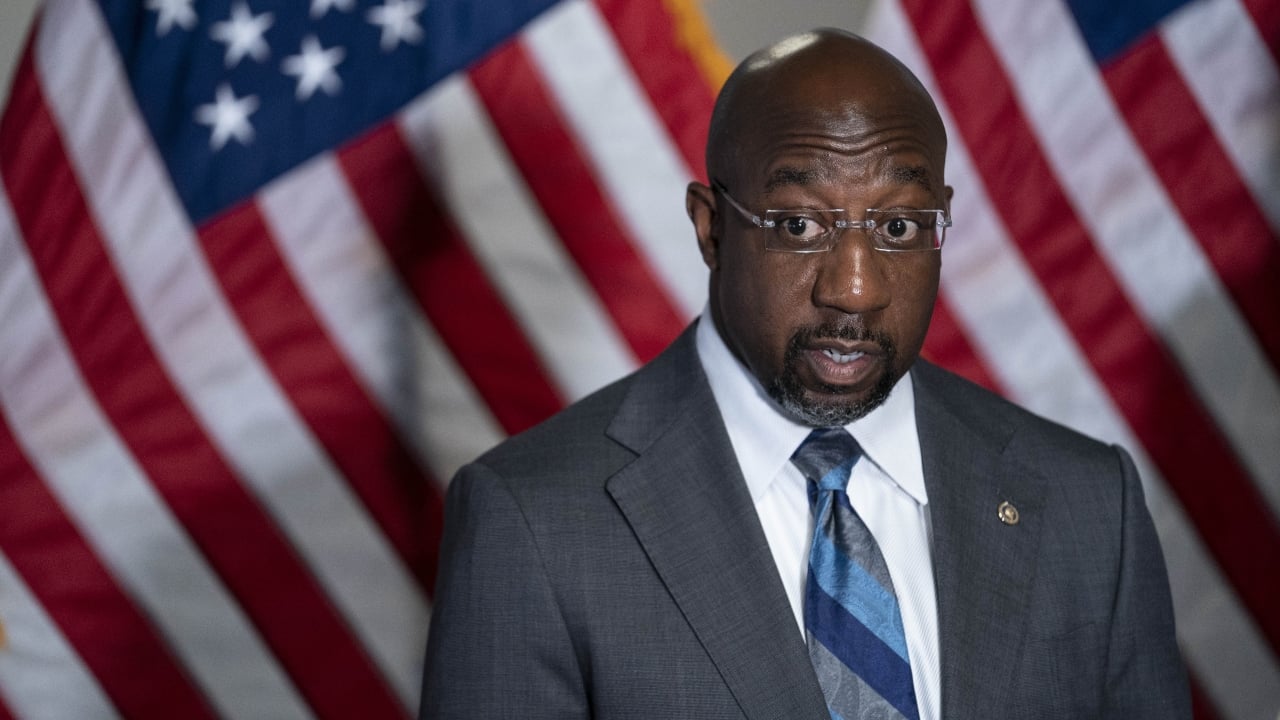We bring news that matters to your inbox, to help you stay informed and entertained.
Terms of Use and Privacy Policy Agreement
WELCOME TO THE FAMILY! Please check your email for confirmation from us.
The Georgia senator vowed to continue the “fight to get voting rights legislation passed in this Congress” as he reflected on his reading of Dr. King’s “Letter from Birmingham Jail” in Congress.
Sixty years after Dr. Martin Luther King Jr.’s “Letter from Birmingham Jail” was published, a bipartisan group of U.S. senators read King’s famous dispatch in an annual tradition on Capitol Hill commemorating the civil rights leader’s message of moral conviction and standing up against injustice.
In the 1963 letter, in which he famously wrote, “Injustice anywhere is a threat to justice everywhere,” King indignantly addressed white clergymen who criticized his nonviolent campaign against racism and racial segregation in Birmingham.
Sen. Raphael Warnock of Georgia was among the lawmakers who took to the Senate floor on Wednesday to read portions of King’s letter, which he told theGrio he first encountered as a student at Morehouse College in Atlanta, where King also attended.
“That letter is as relevant now as it was when he wrote it in the 1960s,” Warnock said.
As a recent example, he pointed to the expulsions of Democratic Tennessee state Reps. Justin J. Pearson and Justin Jones. The young Black legislators and their white colleague, Rep. Gloria Johnson, collectively known as the Tennessee Three, were admonished for joining a state capitol protest against Republican inaction on new gun restriction legislation.
“A legislature in Tennessee failed to respond to the issue of gun violence, even in the wake of, once again, precious young lives [being] taken,” said Warnock, referring to the late March school shooting in Nashville that killed three children and three adults.
Rather than passing gun reform, he said, Republican lawmakers in Tennessee “came down with [a] kind of draconian response to legislators who were trying to push their colleagues to do the right thing.”
A similar attempt to oust a Democratic lawmaker happened recently in Montana, where state Rep. Zooey Zephyr – the state’s first transgender legislator – was expelled from the state House floor for speaking out against her Republican colleagues over a bill that bans gender-affirming health care.
Warnock rejected the legislative targeting of the trans community, telling theGrio, “We have to stand up against the kind of politics of fear and fear-mongering that has convinced us that we ought to be afraid of each other.”
“I say be afraid of politicians who tell us to be afraid of each other,” he continued, “whether we’re talking about people of color or people in the LGBTQ community or immigrants who have made this country great.”
Reflecting on what many described as GOP attacks on the democratic process in states like Tennessee and Montana, Warnock said the country is in need of leaders and civilians “willing to stand up and to bear witness to the American covenant.”
In the face of a seemingly more divided America, where Republican-controlled states are restricting access to voting and drawing partisan district maps that dilute Black voting power, the Georgia politician and pastor said he will continue to use his influential U.S. Senate seat to combat “anti-democratic forces” trying to “steal the people’s voices.”
Without enough Republican support, Democrats failed to pass the John R. Lewis Voting Rights Advancement Act and the Freedom to Vote Act in the last session of Congress. The legislation would restore previous voting rights protections, expand access to voting and add more federal safeguards against voter suppression and corruption.
Despite setbacks on Capitol Hill, Warnock vowed to continue the “fight to get voting rights legislation passed in this Congress.”
“I’m not about to give up on America,” he declared. “Which is why we have to vote. We have to continue to stand up for voting rights.”
Like the 1960s demonstrations led by King, Warnock pointed out, successful movements are “not necessarily from the inside, but from the outside,” saying, “I’m focused not only on the work I do here in the Senate, but on the kinds of grassroots movements that strengthen what we can get done here.”
Warnock also reflected on the conservative efforts behind a wave of abortion bans and anti-LGBTQ legislation over the past year.
“The acid test of the depth of one’s commitment to faith … is measured by your commitment to the most marginalized members of the human family,” he said. “It is that ethic that informs my work every day in the Senate.”
Beyond religion, the reverend added, “We need … people of conscience who do not necessarily claim any faith tradition at all, but believe in justice, compassion, empathy, mercy.”
“[It’s] building what Dr. King called the beloved community,” said Warnock. “We need that now more than ever.”
Gerren Keith Gaynor is a White House Correspondent and the Managing Editor of Politics at theGrio. He is based in Washington, D.C.
TheGrio is FREE on your TV via Apple TV, Amazon Fire, Roku and Android TV. Also, please download theGrio mobile apps today!

